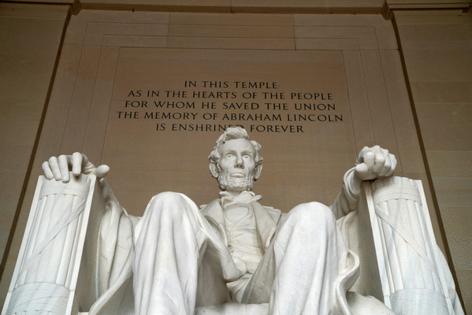Commentary: Recalling America's pre-Civil War struggle with slavery
Published in Op Eds
On November 19, 1863, Abraham Lincoln delivered a powerful 272-word speech, later known as the Gettysburg Address, dedicating a new cemetery on the site of the bloody Civil War battlefield. While many schoolchildren used to memorize Lincoln’s speech, few of us today can get beyond “Four score and seven years ago …”
Indeed, in 2024, the American Council of Trustees and Alumni found that only 23 percent of college students could identify the phrase “government of the people, by the people, for the people.” It turns out Lincoln was prescient when he said that “The world will little note, nor long remember what we say here.”
In his address, Lincoln called on the assemblage to dedicate themselves to the “unfinished business” of ending the war, preserving the Union, and vanquishing slavery. He called this a “new birth of freedom,” and he worried that without a Union victory, free, popular government would “perish from the earth.”
Slavery, of course, has never been consistent with American principles, and ending all vestiges of slavery would remain unfinished business for years. That’s because slavery was deeply ingrained in much of colonial America at the time.
In early November 1775, for example, eight months before the Declaration of Independence was signed, George Washington, the commander-in-chief of the Continental Army, forbade the recruitment of officers from among enlisted Blacks. Less than two weeks later, the Second Continental Congress barred Blacks from enlisting in the army altogether.
Shortages of troops led the Revolutionaries to walk back their bans. In January 1776, Congress allowed serving Blacks to re-enlist. A year later, free Blacks were allowed to join. And a year after that, in 1778, Rhode Island promised manumission to any slave who enlisted.
By contrast, the English actively recruited slaves, with the royal governor of Virginia, Lord Dunmore (John Murray), on November 7, 1775, promising freedom to anyone who joined with the British. Thousands did.
British abolitionists recognized the contradiction in the colonists’ position. One of the founders of the abolitionist movement, David Hartley, a member of Parliament, argued that the Americans should free the slaves on principle, while being pragmatic about their political disputes with Great Britain.
Hartley was the author of the first bill introduced into Parliament for the abolition of slavery. William Wilberforce, who succeeded him in Parliament, went on to lead the fight to abolish slavery in the entire British Empire in 1833.
On November 14, 1775, in a letter to his friend Benjamin Franklin, Hartley proposed a grand bargain. The colonies, he suggested, would recognize British sovereignty, restoring British “honor,” and agree to a return to the conditions of 1763, before the troubles between Britain and the Americans began. In return, the Massachusetts Government Act (which revoked self-government for the colony), the Boston Port Act, and a few other irritations to the colonies would be repealed.
Also in return, the Americans would start to grant slaves certain rights, beginning with the right to trial by jury — a first gesture toward the complete abolition of slavery sought by Hartley. Following such a grand bargain, he opined, the only dispute between Great Britain and America would be which could most rapidly “establish the fundamental rights of liberty to all mankind.”
When Hartley introduced these ideas in Parliament on December 7, 1775, they were overwhelmingly defeated. The British, it seemed, were not yet ready for abolition, either. The disconnect between the principles of the Revolution and slavery was established.
Starting in the 1780s, many of America’s Founders spoke out against slavery. Alexander Hamilton founded the New York Manumission Society in 1785, before the Constitution was drafted, and pushed for emancipation. (New York abolished slavery gradually between 1799 and 1827.) In 1787, George Mason of Virginia refused to sign the Constitution in large part because of slavery. Benjamin Franklin became president of the Pennsylvania Society for the Abolition of Slavery in 1787 and, in 1790, petitioned Congress to end the slave trade.
That principle had not been forgotten. It would take another war and the loss of hundreds of thousands of lives for a new birth of freedom to begin its reign.
____
ABOUT THE WRITER
Frederic J. Fransen is president of Ameritas College Huntington (W.Va.) and CEO of Certell Inc. He wrote this for InsideSources.com.
_____
©2025 Tribune Content Agency, LLC.
























































Comments